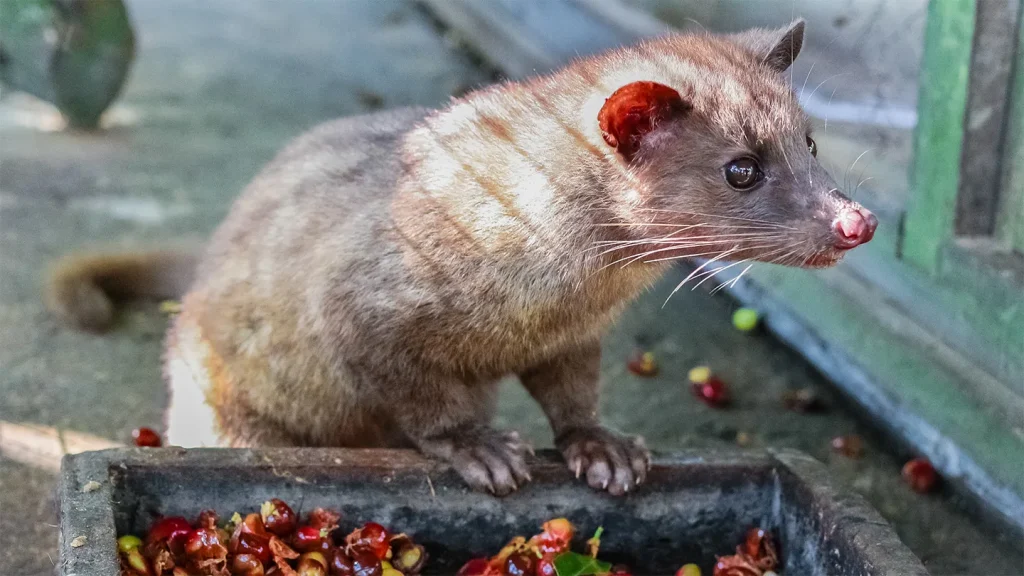The Digestive Magic Behind the World’s Most Expensive Coffee
In the lush coffee-growing regions of southern India, a curious natural process creates one of the world’s most expensive and sought-after beverages. The Asian palm civet (Paradoxurus hermaphroditus), a small catlike mammal native to South and Southeast Asia, has a particular fondness for ripe coffee berries. After consuming these berries, civets digest the fruit pulp but pass the beans through their digestive system largely intact. These beans, collected from civet droppings, command astonishing prices of $600 to $1,300 per pound in the global market—making what’s commonly known as “civet coffee” or “kopi luwak” one of the most exclusive coffee experiences available.
For years, coffee connoisseurs have debated whether there’s actually anything special about these beans beyond their unusual origin story. Is the extraordinary price tag justified by genuine differences in flavor, or is it merely the product of novelty and marketing? Recent scientific research has finally begun to provide concrete answers. A team of researchers led by zoologist Ramit Mitra from the Central University of Kerala set out to investigate the chemical composition of civet-processed coffee beans, comparing them with conventional beans harvested directly from the same plants in the Kodagu district of southern India, a region known for its Robusta coffee production and wild civet population.
The findings, published in October 2023 in Scientific Reports, reveal fascinating insights into how the civet’s digestive system transforms coffee beans. The research team discovered that beans collected from civet droppings contained significantly higher fat content than their conventional counterparts. Specifically, they identified elevated levels of two fatty acid methyl esters: caprylic acid methyl ester and capric acid methyl ester. These compounds are particularly significant because fat content plays a crucial role in coffee’s aroma profile and overall flavor experience, with the specific fatty acids potentially contributing a subtle, creamy, dairy-like quality to the resulting brew. The researchers noted that these chemical changes likely contribute to civet coffee’s distinctive taste profile that enthusiasts describe as smoother and less bitter than conventional coffee.
Complementing these increased fat compounds, the study also revealed that civet-processed beans contained lower levels of protein and caffeine compared to beans harvested directly from plants. This reduction in caffeine content particularly helps explain one of civet coffee’s most celebrated characteristics—its remarkably low bitterness relative to other coffees. The research team suggests that this transformation occurs through fermentation within the civet’s digestive tract, potentially facilitated by specific bacteria called Gluconobacter found in civet feces but not typically present in the excrement of other animals. This bacterial action appears to be the “fermenting genius” that creates civet coffee’s unique chemical signature.
While these findings provide compelling evidence that civet coffee has genuinely distinct chemical properties that could justify its premium status, the researchers emphasize some important caveats. The analyses were performed on unroasted beans, and the roasting process—which all coffee beans undergo before brewing—can significantly alter a coffee’s flavor profile by changing its acidity and the concentration of various chemical compounds. Additionally, while this study focused on Robusta beans, which are common in Indian coffee production, the vast majority of commercial civet coffee worldwide is produced using Arabica beans, which have different baseline characteristics. These factors suggest that further research is needed to fully understand the complete flavor development in the final cup of civet coffee.
The extraordinary premium commanded by civet coffee has created significant ethical concerns within the industry. While traditional civet coffee relied on beans collected from wild civets that naturally selected and consumed only the ripest coffee berries, the massive demand and high prices have led to the development of civet farms where animals are often kept in poor conditions and force-fed coffee berries. This industrialization of the process not only raises serious animal welfare issues but may also affect the quality of the resulting coffee, as stressed captive civets don’t select berries based on ripeness and may have altered digestive processes. As science continues to unravel the chemical mysteries behind civet coffee’s unique properties, consumers face important questions about whether the distinctive taste experience justifies both the steep price tag and the ethical considerations surrounding its production.













